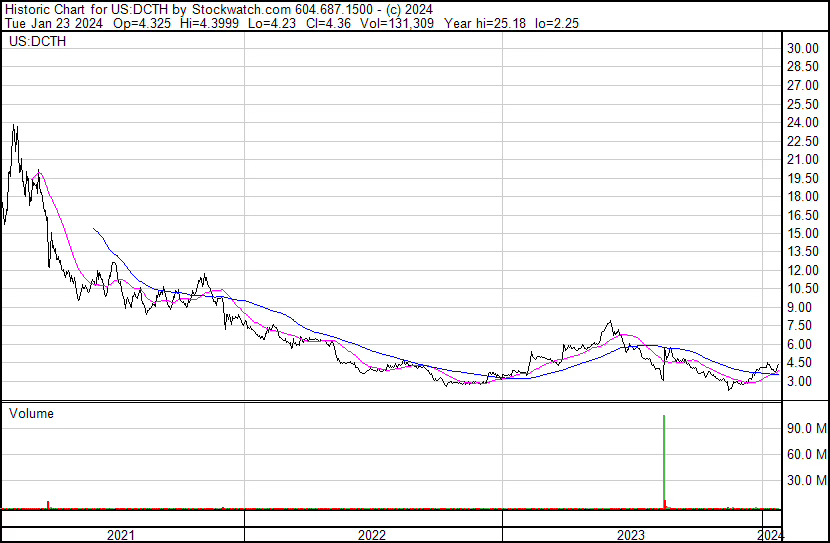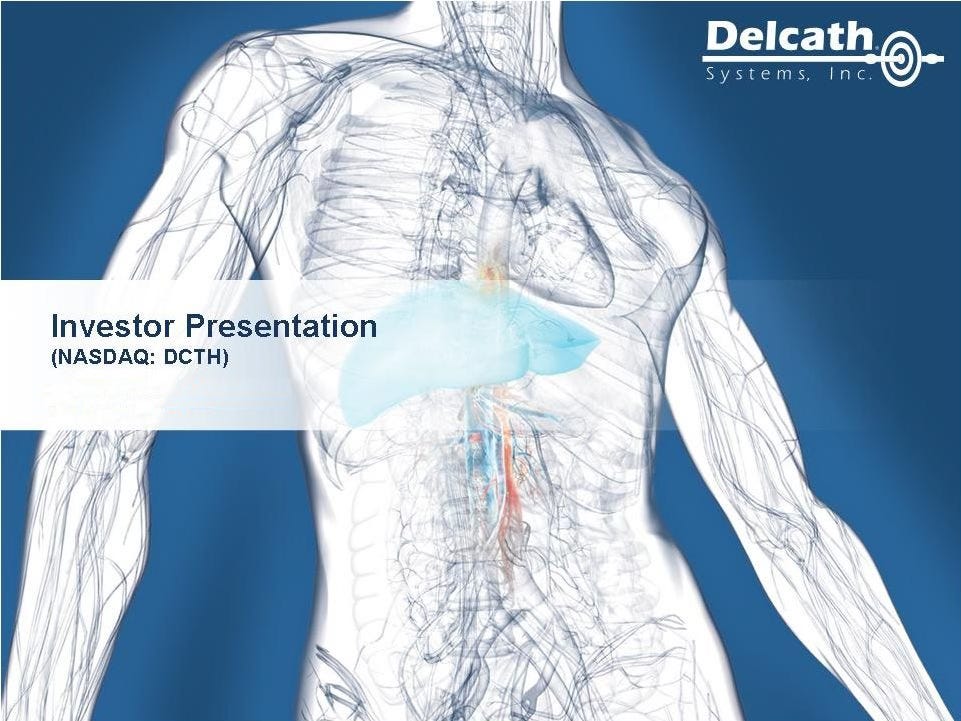Cancer Treatment Breakthrough Set to Print Cash
Delcath Systems (NASDAQ:DCTH) could deliver a 22.4X return by 2026. ‘Rainy Man’ on the prospects for the company and why investors are hesitating…
Dear Big Score readers,
This is a guest post by a friend who has been dedicated to small-cap investing for 30 years. He's successful but shuns the spotlight. So, he writes under the name 'Rainy Man' here. I trust him and value his ideas. I’ve invested in DCTH too with a ~$6 avg (DCTH last @ $4.36). You might find this interesting. Tommy
A Better Way to Treat Liver Cancers
Liver cancer is often a death sentence. Roughly 50% of cancer’s metastasize there. Treatment is extremely difficult. Tumour removal rarely works, so doctors often send chemo beads to the liver with varied effectiveness, or rely on harsher therapies.
A small-cap company I am an investor in is pioneering a better way. Delcath Systems (NASDAQ:DCTH) is based in Queensbury, New York. Their Hepzato Kit treatment gained initial FDA approval last Summer and began commercialization this quarter. It’s the obvious leading solution to treat liver cancers, and presents a compelling opportunity for investors.
Hepzato Kit treatment is also known as percutaneous hepatic perfusion (PHP), and Delcath owns the commercial rights. PHP is like isolating the liver and treating it without affecting the rest of the body. Doctors use catheters and balloons to keep the liver separate from the body's circulatory system during the treatment. This allows them to deliver a high dose of the chemotherapy drug directly to the liver. Then, the blood coming out of the liver is filtered to remove the chemotherapy drug before it goes back into the body. This method makes sure that the rest of the body is not exposed to the high dose of chemotherapy.
This treatment is important because liver metastases are a major concern in patients with uveal melanoma. Without effective treatment, these metastases can be life-threatening. Hepzato has shown positive results in clinical trials, with a significant number of patients responding to the treatment. The overall response rate observed was 36.3%, and patients could undergo this treatment multiple times. Side effects are known and can be managed with standard care.
FDA approval was granted to treat uveal melanoma, a rare form of eye cancer with a potential $600M annual market, but the opportunity is much bigger. It makes sense Hepzato will be used for other liver cancers despite no FDA approval, and could be a huge win for patient investors.
Delcath Stock Summary

Delcath Systems has a current market capitalization of US $125M (28.6M shares at $4.36/) plus ~$9M debt. Cash was $40M at Sep 30, 2023. Burn rate is high at $4-5M/month. All figures USD.
The company is targeting $330M peak sales, and at reasonable revenue 85% gross margins (excluding fixed costs of ~$55M per year). This would translate to over $200M earnings before tax. At a 15X multiple would make this stock $100 per share, 22.4X above the current share price. Seems too crazy but the main point is there is major upside.
Why So Cheap?
1/ Delcath isn't biotech; it's a bulky medical device needing training. Biotech attracts big money and PhDs. They prefer new, exciting drugs, not this. Big biotech funds bought in, then sold off. Delcath's stock will rise with sales. They need to prove their success first.
2/ ‘Show me’ stage. The commercial launch of Delcath's product is starting slowly. Sales are expected to increase each quarter, from $3-5 million now to $12-16 million by the fourth quarter. When sales hit $10 million, the company will be close to breaking even. One doctor tweeted about planning to generate $900,000 in sales in January alone. If this trend continues, reaching $3 million this quarter is likely. I think it’s possible management is low-balling the guidance.
The launch involves a process called proctoring. This means doctors must either visit a training centre or have a certified Hepzato physician come to them. The physician then guides them through the procedure. As more doctors get this training, the number of procedures will likely increase quickly. This could greatly boost the stock.
A key step for the company is getting an official reimbursement code. This is expected in the coming months and should be a big plus. Many doctors hesitate to use treatments without a specific code. It can complicate getting paid and slow down the payment process. Getting this code is seen as just a formality now.
This step-by-step increase in sales, training, and official recognition marks a significant phase in the company's growth and investor interest.
3/ Delcath might need temporary funding to reach break-even. They want to avoid issuing more shares to protect current shareholders' value. They have a $9M debt, paid monthly until August. A flexible debt solution, like a line of credit, is ideal. This can be repaid with future cash flows, despite high interest.
DCTH stock will move higher as these issues are resolved, in my opinion.
Gerard Michel, Delcath's CEO, successfully led the company through FDA approval. However, he's been criticised for the company's valuation. Michel is detail-oriented but lacks the flair of a passionate sales leader. In meetings and conference calls, he focuses on specifics and misses highlighting the larger vision.
Michel left a comfortable CFO role at Vericel, drawn by Delcath's potential. Vericel, initially a low-profile science company, struggled early on. It's now valued at $1.5 billion. This success came from mastering cell delivery in medical applications, like sports medicine. Delcath could mirror this trajectory, indicating a promising future for investors.
Will Delcath's big year be 2024 or 2025? We don't know yet. But success, more sales, and a higher stock give them big chances. They can then tackle other cancers like colorectal or breast. I love these setups.
Currently, 2000 patients have the cancer Delcath can treat. There are more with other types: ICC (3500), neuroendocrine (8000), colorectal (35000), and hepatocellular (40000).
Management can't say much. But using Hepzato Kit for other liver cancers makes sense. It's not FDA-approved for these yet. But it's effective, and doctors understand it. There are also studies on bile duct cancer. This might be the next target. Doctors could get paid for using it this way. This use might be bigger than the approved one.
Immunotherapies (IO) are really hot right now. Look at Immunocore IMCR, valued at $3.5 billion. But their treatment for ocular melanoma isn't very effective. They only help 45% of patients, with an 18% response rate. This is partly because the liver's immune system is less active. It's designed to let nutrients pass without a strong reaction.
IHP is a complex treatment for liver diseases. It connects you to machines that act like your organs, while giving chemo to the liver. Sadly, it has a high death rate. It was used because it's good at killing cancer. Delcath's Hepzato Kit uses a similar idea but is much safer and very effective.
It's really striking when IHP is combined with immunotherapy. The response rate is amazing: 50% for colorectal and neuroendocrine cancers. Compare that to Immunocore's 18% rate for ocular melanoma. Hepzato Kit alone has a 36.3% rate. It seems clear that using Hepzato with immunotherapies could become the standard of care.
The Chopin study tested Hepzato Kit with immunotherapy. In just 7 patients, the response rate was 85%. A larger study with 76 patients will share results soon. If these are like the small study, it will be a big deal. This could change the game in liver cancer treatment.
Boston Scientific has a liver cancer treatment called Y90. It sends chemo beads to the liver. They bought this for $4 billion, making $400 million in sales. Y90 costs $18,000 per treatment, cheaper than Hepzato's $185,000. But Hepzato Kit works better. Boston Scientific's sales head moved to Delcath. It’s not much of a leap that one of the major players will attempt to acquire Delcath once the revenues ramp up. Hepzato Kit is too strategic to ignore.
Delcath's Hepzato Kit offers hope for liver cancer patients and a promising opportunity for investors. With effective treatment and growing demand, it's set to revolutionise liver cancer care and deliver significant returns.
I will continue to add on any pullbacks.
DelCath is a speculative stock and might not meet my expectations. Check DelCath's SEC filings for key risks. This isn't investment advice. Verify all facts yourself. Always do your own research and talk to a licensed advisor before investing.






300m peak sales implies treating all 2000 patients available. If all these patients are treated, how many are expected yearly after that?